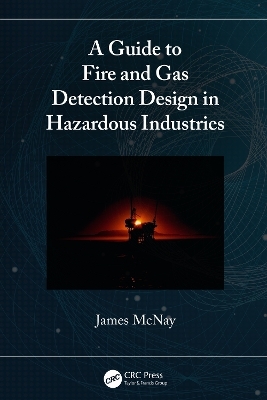
A Guide to Fire and Gas Detection Design in Hazardous Industries
CRC Press (Verlag)
978-1-032-16014-6 (ISBN)
In the last 15 years, the field of fire and gas mapping has grown extensively, yet very little is published on the subject. The text includes deeper discussions on important engineering factors associated with fire and gas detection, along with anecdotes and examples.
It will guide the readers on what to consider when you do not have access to proprietary guides, and how to interpret the design process even when one does not have access to a guidance document. The text covers important topics including visual flame detection, flame detection mapping, infrared point gas detector (IRPGD), infrared open path gas detector (OPGD), ultrasonic/acoustic design, and gas detection mapping.
The book plays the following roles:
Explores practical aspects of designing a detection layout
Enables users in interpreting a detector data sheet and coverage analysis
Teaches readers working on a project to cut through the marketing of detection and design an effective system
Inclusion of real-life experiences on projects will provide engineers with clear examples of where things can, and often do, go wrong
It is an ideal text for professionals and graduate students working in the fields of occupational health and safety, fire protection engineering, and environmental safety.
The text discusses fundamental aspects of fire and gas mapping, which has been applied with great success in many parts of the world and is commonly adopted by the major operators in the process industries.
James McNay, PhD., has committed his career to the improvement of fire safety in both the built environment and the high hazard industries. James is currently Technical Director within the Fire Division of Hydrock working within the Built and Natural Environment. Previously he was Managing Director at Micropack (Engineering) Ltd. and specialised in the design of fire and gas detection systems in high hazard industries. Both as a practicing specialist detection consultant, and while managing the engineering and consultancy teams at Micropack Headquarters in Aberdeen, Scotland, James had significant involvement in the design of F&G detection systems in the Gulf of Mexico, Alaska, North Sea, Caspian Sea, Australia, Qatar, Oman, Malaysia, Thailand and Vietnam. Through this experience James has been involved in the generation and development of some of the most widely adopted F&G standards applied across the world by various hazardous facility operators. Most notably, James chaired the BSI committee tasked with generating BS60080 Explosive and Toxic Atmospheres: Hazard Detection Mapping: Guidance on the placement of permanently installed detection devices using software tools and other techniques in 2020. James has also served as the Fire and Gas Chair for the Safety and Cybersecurity Division of the International Society for Automation (ISA) between 2015 and 2020. James received his PhD from the Department of Naval Architecture and Marine Engineering at the University of Strathclyde, specialising in systemic safety engineering. In the development of ‘A structured, systemic methodology to improve maritime fire safety in machinery spaces’, James aimed to understand and address why industry often witnesses the same accidents repeat themselves. He discovered through addressing the fire safety problem from a systems perspective in both design and operation, obvious opportunities for improvement, which are often and easily overlooked, become evident. Notably this finding is not solely applicable to industrial fire safety, and has provided James the desire to address challenges from a systemic perspective, from complex technical issues on a high hazard facility or high rise building, to everyday problems like how to stop his dog pulling excessively on the lead on what should be a relaxing walk through the Scottish countryside.
Foreword. Preface. Acknowledgements. List of Acronyms and Abbreviations. About the Author. Introduction to Fire and Gas Detection. Performance-Based F&G Mapping. Systemic Safety. Flame Detection Technologies. Flame Detection in Process Areas. Gas Detection Technologies. Flammable Gas Detection in Process Areas. Notes on Specialised F&G Hazards. Competence. Index.
| Erscheinungsdatum | 28.07.2022 |
|---|---|
| Zusatzinfo | 4 Tables, black and white; 21 Line drawings, black and white; 22 Halftones, black and white; 40 Illustrations, color; 3 Illustrations, black and white |
| Verlagsort | London |
| Sprache | englisch |
| Maße | 156 x 234 mm |
| Gewicht | 260 g |
| Themenwelt | Kunst / Musik / Theater ► Design / Innenarchitektur / Mode |
| Technik ► Bauwesen | |
| Technik ► Umwelttechnik / Biotechnologie | |
| Wirtschaft | |
| ISBN-10 | 1-032-16014-4 / 1032160144 |
| ISBN-13 | 978-1-032-16014-6 / 9781032160146 |
| Zustand | Neuware |
| Informationen gemäß Produktsicherheitsverordnung (GPSR) | |
| Haben Sie eine Frage zum Produkt? |
aus dem Bereich


